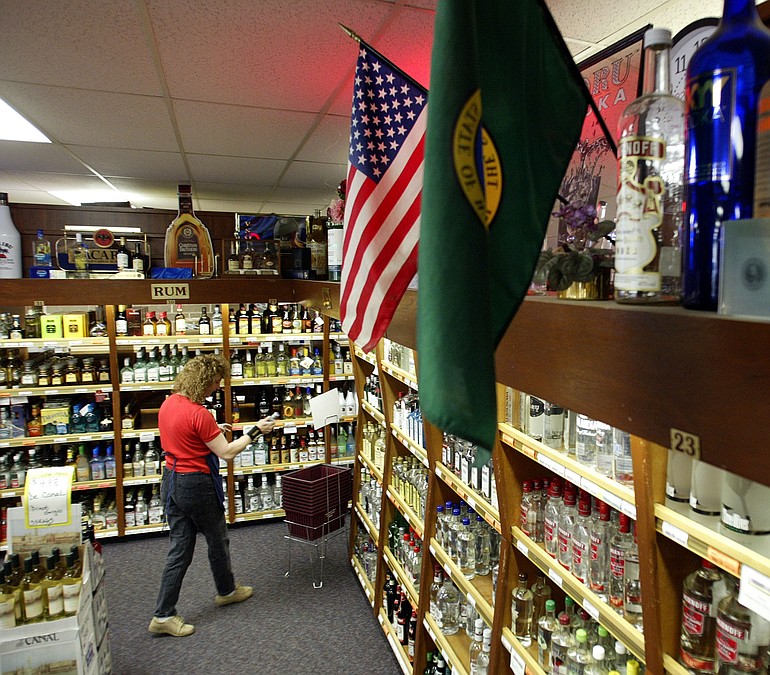OLYMPIA — Washington lawmakers are looking to expand the offerings of state-run liquor stores to include associated products such as ice, mixers and swizzle sticks — a revenue-generating plan that has stirred up controversy among grocers who say it encroaches on their turf.
Two bills making their way through the Legislature would allow the state Liquor Control Board to sell alcohol-related products at its approximately 325 stores, about half of which are managed and run by state employees and the other half by private businesses under contract with the state. Currently, such items can be purchased at the contract stores or at local grocery and convenience stores, but not at state-run establishments.
The plan would generate an estimated $2 million in net profits in the 2011-2013 biennium, according to Rick Garza, the liquor board’s deputy director. Washington faces a projected $5 billion deficit over that period.
“Probably the No. 1 question asked by customers is, ‘Where is the ice?’” Garza said of the state-run stores. “It’s a simple thing: the public wants barware when they come in, and it makes money for the state.”
Grocers say that money is coming out of their pockets. They note that the current profit estimates don’t take into account the loss in sales tax revenue if customers stop purchasing ice and barware from private-sector retailers.
“Many of the products that the liquor stores say they will sell are products that our stores use to help stay profitable while keeping food prices lower,” the Washington Food Industry Association, the state’s independent grocery association, said in a statement urging lawmakers to oppose the two measures.
Washington is one of 18 states where the government regulates the importation, manufacture, distribution, and sale of alcohol. Grocery and convenience stores are authorized to sell beer and wine.
The segregation remains popular. In November, Washington voters rejected two ballot measures that would have taken the state out of the liquor business.
However, the nearly 80-year-old system is in need of modernization, said Rep. Zack Hudgins, the main sponsor of the House version of the proposed legislation.
“The ballot initiatives showed us that the public still wants the state to sell and control alcohol,” the Tukwila Democrat said. “In some areas, the state is seen as doing a money grab this year. But this is less about revenue and more about listening to voters through the initiative process.”
Wider variety sought
The Liquor Control Board commissioned a telephone survey in December to find out how satisfied residents are with the state liquor stores. The survey found that among 599 customers, 61 percent said they would support the sale of a wider variety of merchandise.
Liquor store managers and the unions that represent them say they understand customers’ desire for one-stop shopping.
“Allowing the sale of certain amenities that would go along with a shopper in a liquor store — we don’t have any heartburn over that. We think it might be a fine idea,” said Tom Geiger, a spokesman for United Food and Commercial Workers Local 21, whose 20,000 members include both grocers and liquor store clerks.
But Geiger and others expressed concerns about a provision in Hudgins’ bill that would establish up to five contract liquor stores within grocery stores in highly populated areas as part of a one-year pilot program. They say such a merger presents a safety issue.
“We’d be fine bringing the convenience into the liquor store, but not the convenience of liquor into the grocery store,” Geiger said.
Hudgins said he believes so-called “co-location” is not a threat. The stores set up under the pilot program would be staffed by state employees whose primary concern is public safety, not turning a profit, he said.
But critics say the latest legislative maneuvers represent a departure from the liquor board’s stated mission of promoting health and safety by establishing a controlled environment for the sale of alcohol.
“Last time I checked, convenience is not necessary to protect public health and safety, and it’s far beyond the scope of the Liquor Control Board,” Carolyn Logue, a lobbyist for the food industry association, told the House Ways and Means Committee during an April 13 hearing. “I’m sure the public does not need to be protected from swizzle sticks and barware.”
Garza suspects it’s the bills’ opponents who are failing to put the public first.
“They don’t want the system to be more modern,” he said. “They don’t want the state to be successful because they want the business for themselves, and I think that’s what motivates them.”
Both measures are tied to the budget proposals in their respective legislative chambers. That means they can stay alive until a state budget is finalized — something that could take a while if lawmakers are unable to finish their work by an April 24 deadline and Gov. Chris Gregoire calls them back for a special session.



